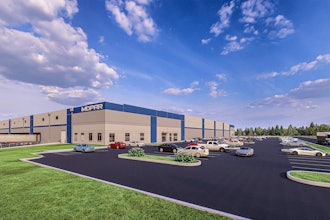DETROIT (AP) -- Massive chunks of concrete hang menacingly from what remains of an upper floor at a gutted building at the vacant Packard car plant, a time-decayed symbol of Detroit's finer things and luxury vehicles.
Taggers and muralists alike have made their mark on the plant's red bricks. Scrappers yanked out the metal. Arsonists have burned tires, shoes and other trash dumped there. And before the end of the year, Peruvian developer Fernando Palazuelo plans to call the 3.5 million-square-foot structure home.
Where others have failed to follow through on plans to either restore the plant or tear it down, Palazuelo says he will follow through on his lofty promises: to clean it out and fix it up; bring in apartments, retail shops, high-tech entrepreneurs, light industrial operations and artist studios; and maybe — one day — even a school.
"I'm just a guy that takes risks, knows how to sit with Mr. Risk and knows where to put Mr. Risk," Palazuelo told The Associated Press Friday as crews prepared to post signs on the sprawling 40-acre site announcing his plans. "I think Detroit ... is the best place at the correct time."
Palazuelo, 59, says that over the past 40 years he's redeveloped more than 120 buildings, some historic and primarily in Spain and Lima, Peru, into mixed-use residential and retail.
Last year, he bought the Packard plant for $405,000 at a Wayne County tax foreclosure auction. The total redevelopment cost should be near $350 million, he said, which he'll pay with rent he receives from his projects in Lima. But he still owes unpaid taxes on the east-side plant, a sum the county says is about $90,000.
Built in the early 1900s, the Albert Kahn-designed Packard plant's size and scope illustrated the then-muscle and might of the city's car companies. The last auto was made there in the mid- to late-1950s and the various buildings eventually were used as warehouses, other manufacturing and small industrial projects.
The city of Detroit claimed the property in 1994 after former owners failed to pay thousands of dollars in back taxes. In 1998, Detroit ordered the remaining 89 tenants to move out in advance of a demolition that never materialized.
The city has said razing the structures and cleaning out polluted soil could cost as much as $20 million. The last private owner planned to tear it down, but lost the property because of taxes. Palazuelo said Friday that the taxes he owes as part of buying the property will be paid.
Interest in the plant and its history resurfaced four years ago when a small Detroit art gallery cut away and removed a section of wall featuring artwork and a message by elusive British graffiti artist Banksy — a stenciled figure of a child holding a bucket of red paint and brush alongside the words: "I remember when all this was trees."
Artists, at least, would heed Palazuelo's call to make use of the plant, said Tate Olsen, founding director of the Kunsthalle Detroit contemporary art museum.
"Detroit is prepared and very ready to become an international destination for artists," she said. "There's a difference between regular eyes and artists' eyes. The vision we are driven by ... we know how to get there."
That's sort of what how Palazuelo sees his very own piece of Detroit.
"I see wood. I see reinforced concrete. I see brick. I see iron — many different elements that speak about the past of the factory," he said. "History is something that happens. It's glorious history or very unhappy history. But it's history."
Timothy Jones, who lives at a motel near the plant, likes Palazuelo's ideas. He's just skeptical — on Friday, he alerted Palazuelo to a small fire burning on an upper floor.
"The size is just too much," Jones, 55, told the AP. "I'm happy that someone is trying, but I think he's going to fail."
Palazuelo is no stranger to adversity. Earlier in the week, he told a group of Detroit professionals that the global recession left him nearly penniless and $24 million in debt from some projects in Peru.
"It's a normal debt of real estate development," he said Friday. "My banks support me. They are very happy to have me as a customer."
Starting Monday, crews are expected to begin clearing out one of the buildings that will be converted into Palazuelo's offices and an apartment. If there is demand for the space, he believes his vision could be completed in about seven years.
"If the reaction of our customers is going to be slow and very conservative, it's going to be more than a 10-year project," Palazuelo said. "This is not going to be a normal development."






















